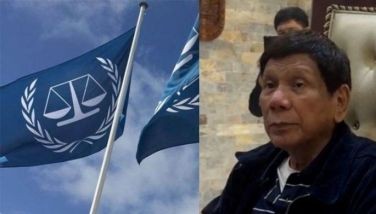Penetrating the corporate barrier

May 18, 2004 | 12:00am
A subsidiary corporation has an independent and separate juridical personality distinct from that of its parent company. This is the principle applied in this case between MV and L. Inc. ( LOI).
MV was the General Manager of Sky Vision, a subsidiary of LOI. On January 6, 1997, MV as borrower, and LOI through its president as lender, entered into a notarized loan agreement for the sum of P10 million payable in installments and to be covered by a real estate mortgage of MV’s properties.
When MV failed to pay the installments as they became due, he made a proposal respecting the settlement of the loan. In reply, LOI advised him by letter that he may use his retirement benefits in Sky Vision in partial settlement of his loan after he settles his accountabilities to the latter and gives his written instructions to it.
Nothing came out of this settlement as the parties could not agree on the computation of the imputed liquidated advances to MV by Sky Vision. So LOI filed an action in the RTC based on the loan agreement, alleging that MV violated the same by his failure to pay the installments and to put up the collateral.
In answer, MV alleged that the loan agreement was merely a "cover document" evidencing the reward to him of P10 million for his loyalty and excellent performance as General Manager of Sky Vision. As compulsory counterclaim, MV asked for the payment of his retirement benefits, unpaid salaries, unpaid share in the net income, reasonable return on the stock ownership plan and other benefits for services rendered totaling P103,020,000.00 plus moral damages of P15 million for the tortuous manner by which he was forced to retire.
LOI asked the RTC to dismiss the counterclaim of MV on the ground of lack of jurisdiction. LOI said that it is not the real party-in-interest of the said counterclaim but Sky Vision its subsidiary which is the employer of MV. The latter on the other hand contended that jurisdiction over the subsidiary was justified by piercing the veil of corporate fiction. He claimed LOI had complete stock control of Sky Vision so there is identity of interest between LOI and Sky Vision to merit the piercing of the veil of corporate fiction.
Was MV correct?
No.
Piercing the veil of corporate fiction is warranted only in cases when the separate legal entity is used to defeat public convenience, justify wrong, protect fraud, or defend crime, such that in the case of two corporations, the law will regard them as merged into one. The rationale behind piercing a corporation’s identity is to remove the barrier between the corporation and the persons comprising it to thwart the fraudulent and illegal schemes of those who use the corporate personality as a shield for undertaking certain proscribed activities.
In applying the doctrine, the following must be established: (1) complete, not merely majority, stock control; (2) such control must have been used to commit fraud or wrong, to perpetuate the violation of a statutory or other positive legal duty, or dishonest acts in contravention of legal rights; and (3) the aforesaid control and breach of duty must proximately cause the injury or unjust loss complained of.
In this case, it has not been established that LOI has complete control over Sky Vision, not only of finances but of policy and business practice in respect to the transaction involved so that Sky Vision had at the time of the transaction, no separate mind, will or existence of its own. The existence of interlocking directors, corporate officers and shareholders is not enough justification to pierce the veil of corporate fiction in the absence of fraud and other public policy considerations. (Velarde vs. Lopez Inc. G.R. 153886, January 14, 2004)
E-mail: josesison@dsamail.com.ph
MV was the General Manager of Sky Vision, a subsidiary of LOI. On January 6, 1997, MV as borrower, and LOI through its president as lender, entered into a notarized loan agreement for the sum of P10 million payable in installments and to be covered by a real estate mortgage of MV’s properties.
When MV failed to pay the installments as they became due, he made a proposal respecting the settlement of the loan. In reply, LOI advised him by letter that he may use his retirement benefits in Sky Vision in partial settlement of his loan after he settles his accountabilities to the latter and gives his written instructions to it.
Nothing came out of this settlement as the parties could not agree on the computation of the imputed liquidated advances to MV by Sky Vision. So LOI filed an action in the RTC based on the loan agreement, alleging that MV violated the same by his failure to pay the installments and to put up the collateral.
In answer, MV alleged that the loan agreement was merely a "cover document" evidencing the reward to him of P10 million for his loyalty and excellent performance as General Manager of Sky Vision. As compulsory counterclaim, MV asked for the payment of his retirement benefits, unpaid salaries, unpaid share in the net income, reasonable return on the stock ownership plan and other benefits for services rendered totaling P103,020,000.00 plus moral damages of P15 million for the tortuous manner by which he was forced to retire.
LOI asked the RTC to dismiss the counterclaim of MV on the ground of lack of jurisdiction. LOI said that it is not the real party-in-interest of the said counterclaim but Sky Vision its subsidiary which is the employer of MV. The latter on the other hand contended that jurisdiction over the subsidiary was justified by piercing the veil of corporate fiction. He claimed LOI had complete stock control of Sky Vision so there is identity of interest between LOI and Sky Vision to merit the piercing of the veil of corporate fiction.
Was MV correct?
No.
Piercing the veil of corporate fiction is warranted only in cases when the separate legal entity is used to defeat public convenience, justify wrong, protect fraud, or defend crime, such that in the case of two corporations, the law will regard them as merged into one. The rationale behind piercing a corporation’s identity is to remove the barrier between the corporation and the persons comprising it to thwart the fraudulent and illegal schemes of those who use the corporate personality as a shield for undertaking certain proscribed activities.
In applying the doctrine, the following must be established: (1) complete, not merely majority, stock control; (2) such control must have been used to commit fraud or wrong, to perpetuate the violation of a statutory or other positive legal duty, or dishonest acts in contravention of legal rights; and (3) the aforesaid control and breach of duty must proximately cause the injury or unjust loss complained of.
In this case, it has not been established that LOI has complete control over Sky Vision, not only of finances but of policy and business practice in respect to the transaction involved so that Sky Vision had at the time of the transaction, no separate mind, will or existence of its own. The existence of interlocking directors, corporate officers and shareholders is not enough justification to pierce the veil of corporate fiction in the absence of fraud and other public policy considerations. (Velarde vs. Lopez Inc. G.R. 153886, January 14, 2004)
BrandSpace Articles
<
>
- Latest
- Trending
Trending
Latest
Recommended

April 3, 2025 - 12:00am



























